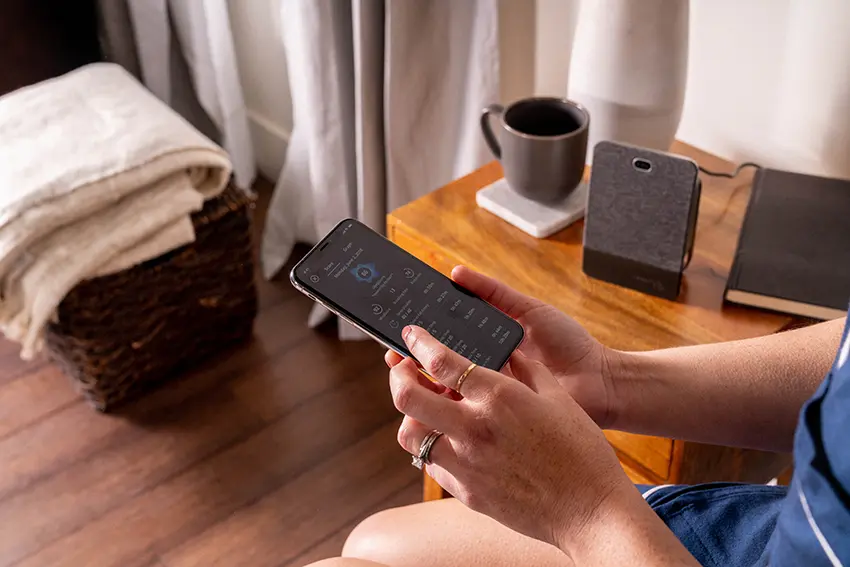How (And Why) You Should Track Your Sleep

Have you been falling asleep halfway through your day or hitting the couch as soon as you get home from work? Are you having a hard time staying awake in traffic or losing your motivation for exercise or activities that you once loved? These experiences can be due to a lack of sleep. Chronic sleep loss increases the risk of serious illnesses such as cardiovascular disease. Getting quality sleep can provide a multitude of benefits for your physical and mental health. Sleep can be a big mood booster as well as an energy enhancer.
So, what can you do to better understand your sleep and start improving it today? In this article, we’ll discuss what happens while you sleep, how to track your sleep, and the benefits of tracking your sleep.
What Happens While I’m Sleeping?
Sleep isn’t a dormant process. During the night as you sleep, your brain is very active as you cycle through the different stages of sleep. While you’re going through these sleep cycles, your brain is busy processing information from the day, and your body is rebuilding tissue that was damaged, replenishing your energy stores, and reproducing new cells. These are only some of the many important functions of sleep!
Why Track My Sleep?
It can feel strange not knowing what’s going on while you sleep. You might have trouble falling asleep or staying asleep, and the negative effects can start to show themselves in your daily life. Luckily, there is accurate technology available for tracking your sleep. Sleep tracking provides insight into your own personal sleep patterns and what may be causing you to feel tired during the day. It might even reveal patterns suggesting the possibility of a sleep disorder, in which case a doctor can prescribe next steps to addressing the issue. The latest technologies can enable you to learn about your sleep behaviors and patterns and allow you to take proactive steps to improve your nightly rest.
How Does Sleep Tracking Work?
The gold standard of sleep tracking is laboratory polysomnogram (PSG), which monitors sleep very closely and thoroughly. This method involves attaching sensors to the head and body, typically overnight, generating data to be analyzed and interpreted by sleep professionals. However, PSG is not accessible to everyone. Fortunately, publicly available sleep measurement technology can now easily be used by consumers who want to learn about their own sleep and how to improve it.
If you haven’t yet checked out the SleepScore App or our premiere product, SleepScore Max, we recommend learning more. The SleepScore App uses your smartphone’s microphone and speaker, whereas the SleepScore Max sensor is placed on your bedside table and used with a companion app. These non-contact sleep systems help you analyze and improve your sleep from the very first night. Our tracking technology has been tested and validated against PSG. Using advanced bio-motion sensor technology, SleepScore technology monitors your sleep by measuring your breathing and physical movements to determine what your nightly sleep looks like. For example, in the morning you will see an in-depth analysis of how you slept and how long you spent in each stage of sleep. Your sleep results are analyzed accounting for averages for your own age and gender, providing a daily SleepScore. The easy-to-understand 100-point scoring system is based on multiple sleep parameters, including how long you slept and how often you woke up. You will discover which aspects of your sleep need improvement, and you’ll receive actionable advice to make that happen.
The New York Times’ Wirecutter recently named SleepScore the best sleep tracking app – for the third year in a row! The experts at Wirecutter appreciated the detailed sleep stage analysis provided by the SleepScore App, concluding that it was better than other sleep trackers. They also highlighted SleepScore’s smart alarm feature, which wakes you up gently because it’s designed to go off during the stage of sleep that feels the least jarring to wake from.
By tracking your night-to-night sleep patterns, including when exactly you fell asleep, when you were awake during the night, your sleep stages, and when you woke up, you can gain a real understanding of your sleep. By taking the time to investigate your personal sleep in this way, you’re taking the right steps to getting better rest. You’ll receive tailored feedback and suggestions on how to improve your sleep.
Using My Sleep Data to Sleep Better
Once you start tracking your sleep, you’ll be able to find patterns in your behaviors that may be affecting your sleep. This information can point to lifestyle changes needed to improve your sleep quality. Tracking sleep reveals your personal sleep difficulties and helps you understand what sleep advice may work best for you, so you can start taking your sleep health into your own hands. Based on your own sleep data, you’ll receive personalized, science-backed advice and recommendations in the app — tools to sleep better and, in turn, live better.
Sleep well!